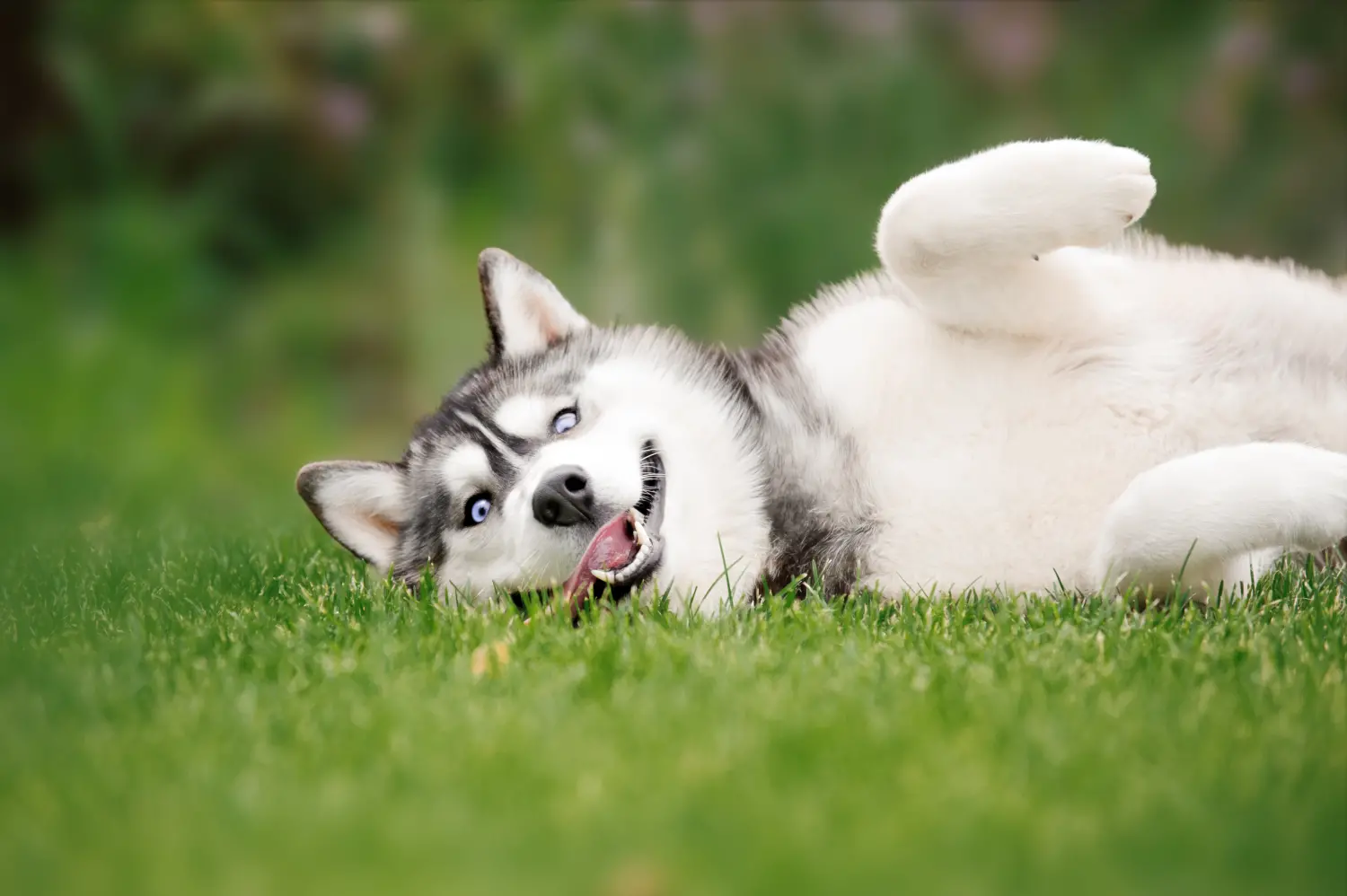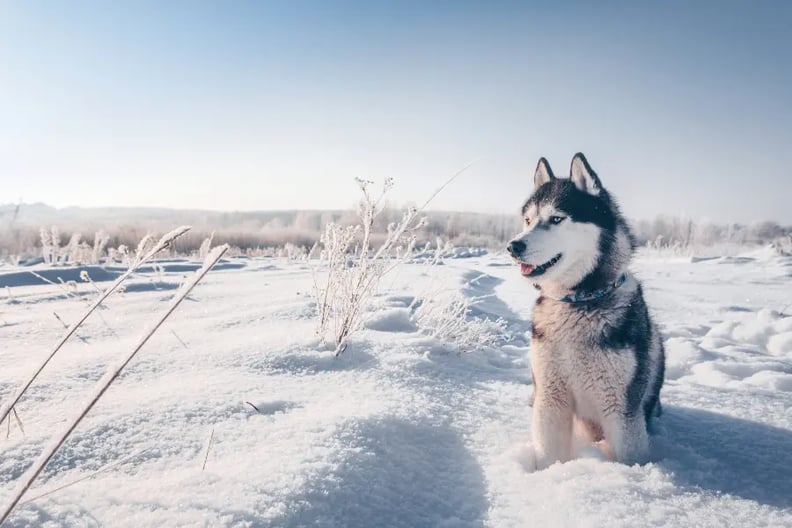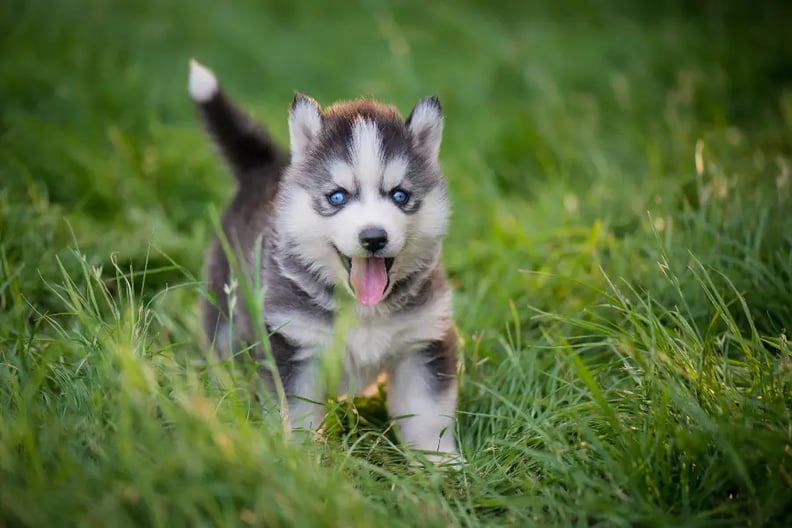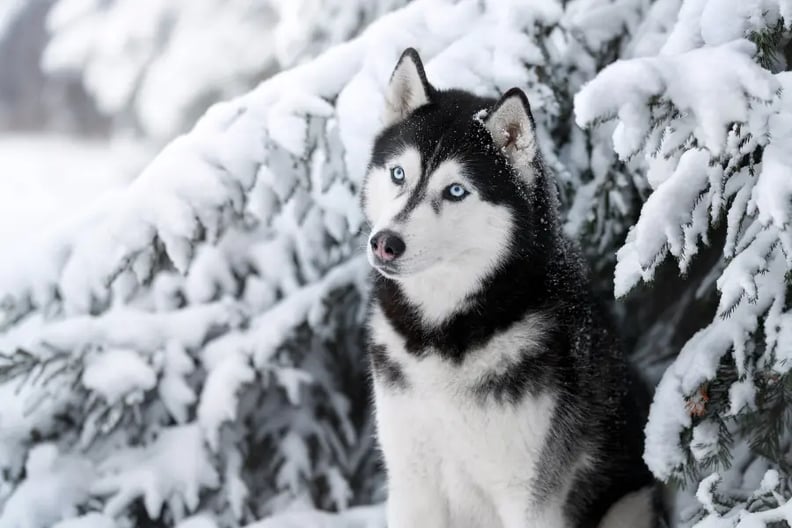
Welcome to the frost-touched world of the Siberian Husky, a breed that combines the majesty of winter wonderlands with the warmth of a truly loyal companion. Known for their striking wolf-like appearance and ice-blue eyes, Siberian Huskies are the poster dog for adventure, loyalty, and unwavering dedication.
In this breed profile of the Husky dog, we'll dash through the snow-covered origins of these canine athletes, explore their cool personality traits, and uncover why owning a Husky might be the most exciting walk (or run!) in the park. We will also examine facts about huskies such as the advantages and disadvantages of this sporting breed.
Many consider the Siberian Husky the ultimate four-legged companion. Huskies as pets might be the perfect choice for the right household. This pooch has boundless energy and a loyal heart. Not to mention, the dog is striking to behold with a luxurious fur coat and mesmerizing eyes.
This sled-pulling breed loves to play and spend time with its owner. If you are looking for an adventure companion, a high-energy pal, and a loyal and exciting pet, then the Husky might be just the breed for you.
Siberian Husky Characteristics
The dogs are a spectacle to behold with their thick, lustrous double coats that come in captivating shades. Siberian Husky colours include black, gray, and white. The white Siberian Husky is especially striking.
The almond-shaped eyes of the breed range from icy blues to warm browns—or sometimes a mesmerizing combination of both.
Size of the Siberian Husky
The breed is medium-sized and muscular. They are built not just for show but for stamina and speed which gives the ability to easily traverse rough terrain and a variety of harsh climates.
Wondering how much do Huskies weigh? The purebred Siberian Husky is a medium-sized breed with a sturdy and athletic build. Adult males typically stand between 21 to 23.5 inches (53 to 60 cm) at the shoulder, while females are slightly smaller, ranging from 20 to 22 inches (51 to 56 cm).
The Siberian Husky weight will range from 45 to 60 pounds (20 to 27 kg) for males, and females are generally between 35 to 50 pounds (16 to 23 kg).
Huskies have a slender but muscular build, but their thick coats often make them look larger than they are. This is why they appear closer in size to a large breed than a medium. They act more like a large breed too, though they have the benefit of a longer lifespan and a lower risk of the hip and joint issues that commonly affect large and giant breeds.
Unlike their canine cousins who prefer barking, Siberian Huskies are known for a wider vocal range. They tend to 'talk' through a series of vocalizations and are renowned for their soulful howls that can fill the air with haunting melodies.
Strong Husky Prey Drive
Many ask, are Siberian Huskies good with kids? They also want to know are Siberian Huskies good with cats. The Husky has a strong prey drive, a remnant of their history as sled dogs where quick reflexes were key to survival. This instinct can make it difficult around smaller animals or small children which they often want to chase.
This doesn't mean they can't learn and adapt, but many huskies require plenty of training and supervision to learn how to play safely and cohabitate with smaller and more fragile siblings. It's not all on your husky. Children and other pets will need to be taught boundaries and appropriate play behaviours to ensure everyone's safety.
Huskies Love Winter
The Arctic breed fares well in colder climates thanks to their insulating coats. In fact, they prefer the cold. Huskies are unlikely to need protective gear like winter dog coats and dog boots unless you live in an area that experiences extreme cold. Even then they won't require the same layers and insulation that other breeds might.
While they thrive in winter, huskies may find the heat challenging, and owners should be prepared to provide them with a cool refuge during the summer months.
As for grooming, their robust coats do shed, particularly during seasonal changes, so regular brushing will keep their fur in check and your home relatively fluff-free.
The Huskys lifespan usually ranges from 10 to 14 years, with some racing well beyond that with the right breeding, diet, and lifestyle.
History of the Siberian Husky

Originating from Siberia's severe climate, the Siberian Husky has a long history that dates back to the Chukchi people of northeastern Asia. Known for their endurance and ability to survive on little food, these dogs were vital for sled transportation across vast, harsh landscapes.
Their significance grew during the early 20th century in Alaska, especially during the Nome Gold Rush, where they revolutionized snowy terrain transport.
Gaining fame in sled dog racing and the notable 1925 serum run to Nome, the "Great Race of Mercy," Huskies demonstrated remarkable speed and resilience as they pulled would-be gold seekers and their gear in sleds.
Recognized by the American Kennel Club in 1930, the Siberian Husky served in World War II's Arctic Search and Rescue Unit, showcasing their versatility, trainability, and stamina.
Today, while still excelling in sled racing, they are beloved as companion animals, admired for their friendly nature and distinctive looks.
Is There a Miniature Husky
Yes, there are different types of Huskies such as the Miniature Husky, which is a smaller version of the Siberian Husky. It has the same captivating wolf-like appearance and vibrant personality but in a more compact size.
These energetic and playful dogs, typically weighing between 20 to 35 pounds, share the striking blue eyes and thick double coats of their larger counterparts.
Despite their reduced size, Mini Huskies retain the intelligence, sociability, and high energy levels of the standard Siberian Husky, making them suitable for those who adore the Husky breed but prefer a smaller dog.
Loyal Siberian Husky Temperament
The temperament of a Siberian Husky is as warm as their native climates are cold. These canines are friendly, gentle souls, brimming with playful energy and a mischievous spirit.
Many wonder, are Huskies a good family dog? Yes, with the right family, they are an excellent choice. While they are loyal to their families, Huskies are not overly dependent or clingy. They enjoy being part of the family activities but also value their independence.
Huskies are highly intelligent and adaptable. They do have an independent streak that might sometimes come off as stubbornness. The breed does require regular engagement because a bored Husky might just turn your backyard into an excavation site as they seek entertainment through digging activities.
The dogs possess high energy levels and need regular exercise. Playfulness is a hallmark of the breed, making them great companions for active individuals or families.
The breed is extremely smart, but their intelligence comes with a strong independent streak. Huskies can be challenging to train due to their willful nature. Their intelligence and independence can make them prone to escape. Secure fencing and supervision outdoors are important.
Huskies can adapt to many living situations, but they thrive in environments where they can get plenty of exercise and have room to roam. The breed doesn’t do well in tropical locations and prefers a cooler climate, such as in Canada.
They make excellent adventure partners and will thrive doing winter activities such as winter camping with dogs, hiking, and many winter activities. Small living spaces, limited outdoor time, and minimal mental stimulation can lead to a poorly behaved and even destructive husky.
Understanding these traits is vital for anyone considering a Husky as a pet, as they require commitment, patience, and an active lifestyle.
Pros and Cons of the Siberian Husky

The Siberian Husky is a breed that captivates many with its striking appearance and unique personality traits. However, like any breed, there are both advantages and challenges associated with owning a Husky.
There is nothing cuter than a Siberian Husky puppy but before deciding to welcome one to the family, you’ll want to familiarize yourself with the pros and cons of the breed.
Pros of Owning a Siberian Husky
-
- Social and Friendly Nature: Huskies are known for their friendly and outgoing demeanour.
- High Energy and Playfulness: If you lead an active lifestyle, a Husky can be a perfect companion. They are energetic and love activities like running, hiking, and playing.
- Distinctive Appearance: With their wolf-like looks, striking blue or multi-coloured eyes, and beautiful fur coats, they are considered beautiful.
- Adaptable to Cold Weather: Huskies thrive in colder climates, thanks to their thick double coat.
- Generally Healthy Breed: Siberian Huskies are known for their robust health.
Cons of Owning a Siberian Husky
-
- High Exercise Needs: Huskies require a lot of physical activity. Without adequate exercise, they can become restless and destructive.
- Shedding and Grooming: Their thick coats shed significantly, especially during the shedding season. Regular grooming is necessary to manage their fur.
- Potential for Vocalization: Huskies are known for being vocal, which includes howling and whining. It can be endearing at first, but their persistent chattiness can be a lot for some people, especially your neighbours.
- Independent Streak: While intelligent, Huskies are known for their independent nature, which can make training a challenge.
- Prey Drive and Tendency to Roam: Their strong prey drive might not make them suitable for homes with small animals.
- Not Ideal for Warm Climates: Due to their thick fur, Huskies can struggle in hot climates.
Even though the Siberian Husky can be a wonderful companion, potential owners need to consider their unique characteristics and requirements. Understanding both the pros and cons of this breed can help ensure a harmonious match between the Husky and its human family.
Choosing the right dog breed is not just about looks, so make sure your lifestyle and environment are suited to a Husky's needs before you get one.
Facts About Huskies Health
Siberian Huskies are generally known for their robust health and longevity, especially when compared to other breeds of similar size. However, like all dog breeds, they are prone to certain health issues. Being aware of these common health problems can help owners take proactive steps in care and prevention.
Here are some health concerns commonly associated with Siberian Huskies:
-
- Hip Dysplasia: This is a genetic condition where the hip joint doesn't fit together perfectly, which can lead to arthritis or lameness.
- Eye Problems: Siberian Huskies are particularly prone to certain eye issues, such as:
- Cataracts: This condition can cause cloudiness in the lens of the eye, leading to vision impairment.
- Progressive Retinal Atrophy (PRA): This degenerative disease progressively worsens a dog's vision, leading to eventual blindness.
- Corneal Dystrophy: This condition affects the cornea and can cause vision problems.
- Zinc Deficiency: Huskies can suffer from zinc deficiency, which can lead to skin problems like hair loss and itchy or scaly skin, especially around the face and eyes.
- Hypothyroidism: This is a condition where the thyroid gland doesn't produce enough hormones.
- Follicular Dysplasia: A condition affecting the hair follicles, leading to abnormal hair growth or hair loss.
- Skin Issues: Siberian Huskies can have sensitive skin that might react to certain foods, environmental factors, or parasites.
- Autoimmune Disorders: They can sometimes be prone to autoimmune conditions, where the immune system attacks the body's own cells and organs.
- Epilepsy: Some Huskies may suffer from epilepsy, a neurological condition that can cause seizures.
Frequently Asked Husky Questions

Do Huskies shed?
Yes, Huskies shed a lot, especially during the changing of seasons when they blow their undercoat. Investing in a deshedding brush, like a FURminator, is a good idea to prevent your home from being taken over by dog fur.
Why do Huskies howl?
Huskies howl as a form of communication, often to express their emotions or to signal to other dogs, much like their wolf ancestors.
Are Huskies smart?
Yes, Huskies are intelligent dogs, but their intelligence is often accompanied by an independent and sometimes stubborn nature.
Are Huskies aggressive?
Huskies are not typically aggressive; they are known for being friendly and social, both with humans and other dogs.
Why are Huskies so dramatic?
Huskies often exhibit dramatic behaviour, including vocalizations and expressive body language, as a way of communicating, and due to their playful and sometimes mischievous nature.
Are Huskies hypoallergenic?
No, Huskies are not hypoallergenic. They shed significantly and are not suitable for people with severe allergies.
Is a Siberian Husky a wolf?
No, a Siberian Husky is not a wolf. While they share a distant ancestral link and have a wolf-like appearance, Huskies are domesticated dogs.
Do Huskies get cold?
Huskies are bred for cold climates, with thick double coats that provide insulation, so they are generally resistant to cold but still need shelter and care in extreme conditions.
.png?width=200&height=66&name=logo%20(1).png)




